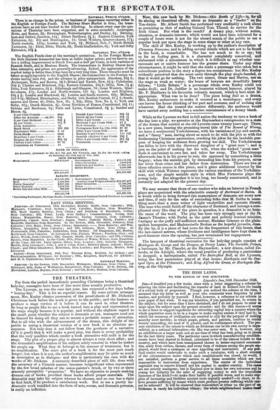THE THEATRES.
Far from the period immediately preceding Christmas being a theatrical holyday, managers have been of late more than usually productive. The Lyceum, as was the case last year, has reopened a few days before "boxing-day." This is for an especial reason. By some private arrange- ment, Mrs. Keeley obtains possession of the proof-sheets of Mr. Dickens's Christmas book before the work is given to the public; and she hastens to produce a stage version of it before it can be used in other theatres. So long as people like to see a book turned into a play and represented on the stage simply because it is popular, and without the slightest regard to the small point whether the subject is dramatic or not, managers need not be blamed for doing all they can to secure a probable means of attraction. But to all who wish the advancement of the drama, this delight of the public in seeing a theatrical version of a new book is an absolute an- noyance. Not only does it not follow from the goodness of a narrative (if it is good) that it will make a good play, but there is every probability that the very qualities which render a book attractive will unfit it for the stage. The plot of a proper play is almost always a very short affair, and the dramatist's amplification of his subject solely consists in what he makes bis people say. What they do belongs to his manner of treatment, but is no amplification. The mere plot of a book is for the most part much longer; but when it is not, the author's amplification may lie quite as much in description as in dialogue: and this is particularly the case with the works of Mr. Dickens. A minutely-described piece of still life, done with the accuracy of a Flemish master, becomes insignificant when represented by the few broad splashes of the scene-painter's brush, or by two or three scarcely perceptible "properties." We have no objection to people making dramas out of books, provided those books afford proper materials. The dramatist may take his subject whence he chooses, and no one has a right to find fault, if he produce a satisfactory work. But to see a purely un- dramatic work tumbled into the form of acts, scenes, and dramatis personre, is really an infliction.
Now, this new book by Mr. Dickens—this Battle of Life-4e9 for all its aiming at theatrical effects, about as dramatic as a "leader* on the Tea-duties. Mr. Albert Smith has performed very creditably a task about as promising as that of making General Tom Thumb do service for the Irish Giant. But what is the result? A dreary play, without action, situation, or dramatic interest; which would not have been tolerated for a couple of hours were it not for the absurd mania of the public to see a popular book put upon the stage in some shape or other at any rate.
The skill of Mrs. Keeley, in working up to the author's description of Clemency Newconze, and in adding several details which are not to be found in the book, is remarkable. She has not much to do or say; but so far as looking goes, it is a character completely conceived, and elaborated with a minuteness in which it is difficult to say whether con- summate art or native humour has the greater share. Under any other circumstances, it might be said that she made a personage who takes but a subordinate position in the story a degree too conspicuous: but Mrs. Keeley evidently perceived that she must carry through the play single-handed, or that it would go for nothing. The two sisters, Grace and Marion, are on the stage as weak as water; the brace of lawyers are dreadfully heavy fellows; "Little Britain" is a personage whom even Keeley could not make droll; and Dr. Jeddler is an humorist without humour, played by Mr. F. Matthews in his favourite volcanic manner, which is here most in- appropriate. What was to be done? The piece being dull as a drama, Mrs. Keeley endeavours to make it succeed as a monologue; and every one leaves the house thinking of her part and costume, and of nothing else whatever. Had she treated the matter differently, the audience would have carried away nothing but a sombre reminiscence of a dreary blank.






























 Previous page
Previous page